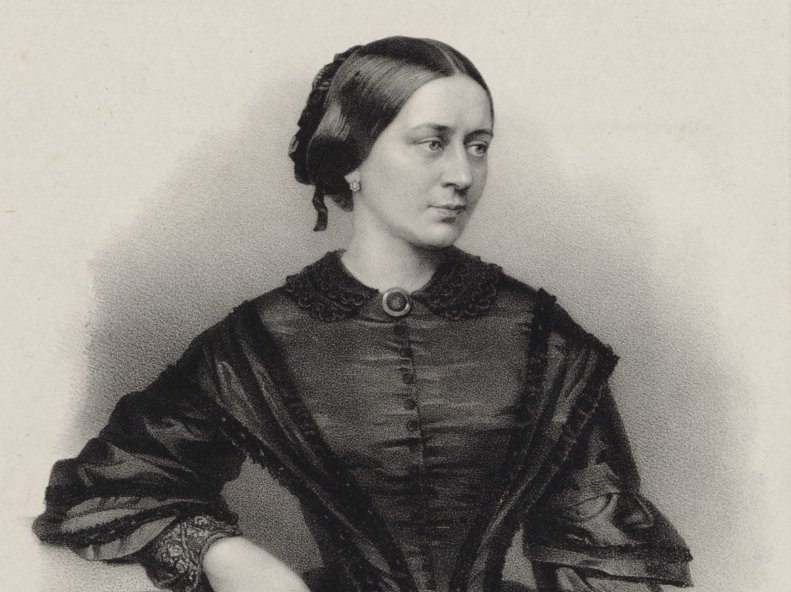- Portrait
- History

Fate dealt Lili Boulanger a cruel hand. The first woman to win the coveted Prix de Rome, she was only nineteen when she effortlessly outclassed every male entrant in the 1913 competition; but within a mere five years, she was dead. One of her final works, D’un matin de printemps (One Morning in Spring), will be heard in early January. This will be the first time that this boldly life-affirming piece has been performed at a concert by the Berliner Philharmoniker.
Good and bad luck – how closely intertwined they were in Lili Boulanger’s life! She had the good fortune of being born into a family of musicians in Paris in 1893. Her father, Ernest, was a composer who taught singing at the Paris Conservatoire, while her mother, Raïssa, was a Russian singer. Together they encouraged their immensely-talented daughter to pursue a musical career. They were also well-integrated with the city's cultural life; they kept an open house and maintained friendly contact with luminaries like Gounod, Massenet and Saint-Saëns. From her earliest childhood, Lili mixed with the people who set the tone of French musical life. She was only six when she performed for Gabriel Fauré, sight-singing flawlessly, but she was equally adept at the piano, and repeatedly astonished her contemporaries with her intelligence and her hunger for knowledge.
When she was only two, Lili Boulanger had fallen ill with bronchial pneumonia, a chronic inflammation of the lungs that left her immune system permanently damaged, severely limiting her activities. From then until her premature death, she was painfully aware of these limitations. But it was not only her own sufferings that kept her constantly reminded of the transitory nature of life. She was only seven when her father suddenly collapsed and died, mid-sentence. It was a traumatic experience for such a small child – it is no surprise that she immediately wrote a song about death. From then on, religion and mysticism were to play a large part in her work.
An exceptionally gifted musician
Lili received support and consolation from her sister Nadia, who was older than her by seven years, and who was also musically gifted. For their mother it went without saying that both girls would become professional musicians and lead independent lives, more especially because marriage was an unlikely prospect for a woman whose health was as frail as Lili’s. And so she sent both children to the Paris Conservatoire.
Nadia proved to be a brilliant student, but even her achievements were surpassed by those of her younger sister. In 1913 Lili won the Prix de Rome with her cantata Faust et Hélène. She was the first woman to win this accolade; the whole of Paris sat up and listened. She won over the jury with her intelligent treatment of the subject, her poeticism, her sensitivity, her warmth and her astute, colourful orchestration. Musica magazine wrote: “Lili Boulanger triumphed over all her male rivals and did so, moreover, with a sovereignty, a speed and an ease that struck the other candidates as seriously unsettling. It was by no means gallantry on the part of the members of the jury that helped her to carry off this easy victory. Quite the opposite: it was said that they treated the young woman more rigorously than her fellow competitors. The jury’s misogyny was well-known.” Lili Boulanger’s cantata was also acclaimed by an enthusiastic Claude Debussy, who voiced his admiration for her in one of his reviews: “Lili Boulanger is only nineteen, but her experience in a wide variety of compositional techniques makes her seem much older.”
Between fame and isolation
The Prix de Rome had already been awarded to such great composers as Berlioz, Bizet, Gounod and Debussy, as well as to Lili’s father and grandfather. It offered its winners an opportunity to spend up to five years studying at the Villa Medici in Rome. In her own case it also encouraged the Italian publishing house of Ricordi to sign a contract with the young composer and to pay her an annual income. But Lili’s health problems prevented her from mixing with the other students and joining in the social life of the Villa Medici to the extent that she would have wished. She often took her meals on her own, causing some resentment among those who were responsible for running the institution, who believed that she was merely feigning her illness in order to gain preferential treatment. Her fellow students, conversely, were bowled over by her charismatic personality.
The outbreak of the First World War brought about a complete change in her life. Instead of writing music, she and her sister founded the Comité franco-américain du Conservatoire national, which offered moral support to the Conservatoire students who had been called up to serve in the armed forces. They sent off letters and parcels and published a newspaper that allowed the music students to stay in touch with each other. This commitment weighed heavily on Lili’s health; wracked with pain and bouts of fever, she was only able to work while lying down. But while her body was giving out, her mind was still teeming with artistic plans and ideas, all of them intended to defiantly optimistic. Her life ended on 15 March 1918.
A legacy of feverish productivity
The music that Lili Boulanger bequeathed to posterity is resolutely creative; it is idiosyncratic, imaginative and brimming with tone colours. It also forges a link between Impressionism and the early modern period. As a composer, she was in total control of the iridescent interplay of the most disparate nuances in terms of both timbre and sonority, a quality that she had learnt from Debussy. But she was also inspired by the use of modes, like her mentor Fauré. Despite these influences, her language was distinctively her own.
Lili Boulanger made her public debut as a composer in 1911 with two vocal works that were hailed by the critic of Le Monde Musical as sensational for their “freshness and inspiration”. By her own admission, their composer was “completely overwhelmed” when she heard her music performed for the first time in public.
The final works
Lili Boulanger’s last completed compositions are a further expression of the two underlying aspects of a life that encapsulated both good and bad luck: the radiant, life-affirming D’un matin de printemps is in the starkest possible contrast to both the infinitely plaintive D’un soir triste (A Sad Evening) and the delicate mood of her Pie Jesu, a setting of part of the final couplet of the Dies irae that is often included in settings of the Requiem Mass.
Lili Boulanger was only twenty-four years old when she died. Her sister Nadia, who had started to teach immediately after completing her studies, survived her by sixty-one years. Nadia became one of the most famous composition teachers of the twentieth century, with a panoply of pupils that included Aaron Copland, Astor Piazzolla, Elliott Carter and Philip Glass. Nadia was also tireless in promoting her late sister’s music. Despite this, these works are heard far too rarely in today's concert halls.

The composer Marianna Martines
Composing child prodigy, harpsichord virtuoso and singer: in 17th century Vienna, her domestic academies were musical hotspots.

Princess or wallflower?
In the 1920s, Germaine Tailleferre stirred up the musical life of France as a member of the composers’ collective “Les Six”, yet she still fell into neglect. Here is a portrait of her turbulent life.

The woman of the century
Although she is often remembered chiefly as the wife of the composer Robert Schumann, in her own day, Clara Schumann led a high-profile life as a pianist, composer and teacher.